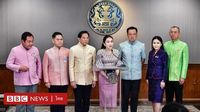The Thai government has decided to postpone the discussion of the controversial Entertainment Complex bill, which includes provisions for casinos, originally scheduled for April 9, 2025. Prime Minister Paetongtarn Shinawatra announced the delay, citing the need to prioritize pressing issues such as natural disaster relief and the economic impacts of rising U.S. tariffs on Thai imports.
During a press conference, Prime Minister Shinawatra stated, "We need to focus on urgent matters first, especially the aftermath of the earthquake and the economic difficulties facing our citizens." This decision comes after a series of discussions among coalition party leaders, who agreed that the Entertainment Complex bill should not take precedence over more immediate concerns affecting the public.
The Entertainment Complex bill, which aims to create venues that include gambling facilities, has faced significant backlash from various sectors of society. Critics argue that the government is rushing the legislation without adequate public consultation or consideration of its potential social impacts. The bill was first introduced to the Cabinet on March 27, 2025, just a day after a no-confidence debate against the government, and was quickly pushed to the parliamentary agenda.
On April 2, a coalition of over 100 civil society organizations, led by the Foundation for the Campaign Against Gambling, submitted a petition to the Speaker of the House and opposition leaders, urging them to reject the bill. They expressed concerns over the government's haste, especially amid ongoing natural disasters and political tensions. The petition highlighted the potential for increased social issues, including crime and addiction, should gambling be legalized.
Former senators and political activists have also voiced their opposition, claiming that the government is deviating from its electoral promises. A statement from a group of 189 former senators emphasized that gambling was not part of the coalition's campaign platform. They argued, "This is a new and urgent project that contradicts the principles of democracy and the will of the people. It is a deception to gain power through elections and then act arbitrarily."
Concerns about the potential social ramifications of legalized gambling are widespread. Economists and social scientists from Thammasat University released a statement asserting that the economic benefits touted by the government are unfounded and that gambling does not contribute to genuine wealth creation. "Gambling merely redistributes money from one group to another without generating new economic value," they stated.
Health professionals have also joined the opposition, citing studies linking gambling to mental health issues, including depression and anxiety. A collective of 455 alumni from Chulalongkorn University echoed these sentiments, warning that the introduction of casinos could exacerbate existing social problems, particularly among vulnerable populations, including youth.
Despite the government's assurances that gambling facilities would only occupy a maximum of 10% of the Entertainment Complex, critics argue that this is insufficient to mitigate the risks associated with gambling. They assert that casinos tend to attract criminal activity, including money laundering, drug trafficking, and human trafficking.
In the face of growing public dissent, the Prime Minister acknowledged the need for clearer communication with the public about the government's intentions. "The concept of the Entertainment Complex has been misrepresented as merely a casino, which is not our intention. We are looking at job creation and economic opportunities," she clarified.
As the parliamentary session approaches its end, the government plans to revisit the bill after the Songkran festival, with a focus on gathering more public feedback and addressing concerns raised by various stakeholders. The Prime Minister indicated that discussions would continue, and the government remains committed to exploring avenues for enhancing tourism and economic growth.
On the ground, protests against the Entertainment Complex bill are set to continue. Activist groups, including the People's Reform Student Network, have organized demonstrations, urging citizens to express their opposition to the proposed legislation. They plan to gather in white shirts as a symbol of peace and unity against the bill.
In addition to the protests in Bangkok, similar movements are expected across various provinces, where local residents are voicing their concerns about the potential impacts of legalized gambling on their communities. Residents in Lopburi and Phatthalung have already begun signing petitions against the bill, emphasizing their desire to prevent the introduction of casinos in their regions.
As the debate over the Entertainment Complex bill continues, the government faces mounting pressure to balance economic aspirations with the social responsibilities it holds towards its citizens. The outcome of this legislative proposal could have lasting implications for Thailand's socio-economic landscape, making it a pivotal issue for the government in the coming months.





